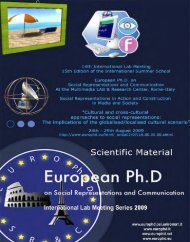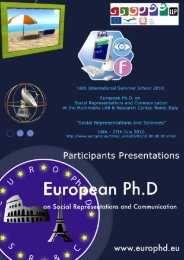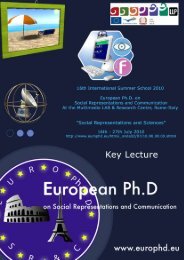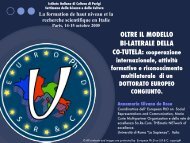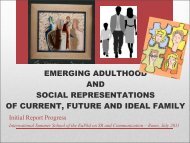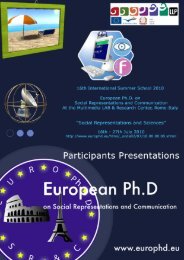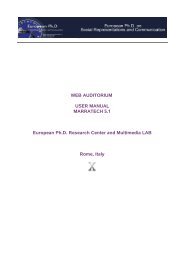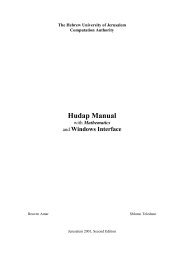The "boomerang" effect of the radicalism in discourse analysis
The "boomerang" effect of the radicalism in discourse analysis
The "boomerang" effect of the radicalism in discourse analysis
Create successful ePaper yourself
Turn your PDF publications into a flip-book with our unique Google optimized e-Paper software.
RDA, and even more <strong>the</strong> conversational <strong>analysis</strong>, studies <strong>the</strong> way <strong>in</strong> which, <strong>in</strong> <strong>the</strong><br />
relational micro-contexts, socially negotiated <strong>discourse</strong>s are produced at a particular<br />
time. On <strong>the</strong> contrary, <strong>the</strong> SRT studies ma<strong>in</strong>ly <strong>the</strong> way <strong>in</strong> which belong<strong>in</strong>g to a macrocultural<br />
macro-context - and more specifically <strong>the</strong> multiple belong<strong>in</strong>g to various groups<br />
and social <strong>in</strong>stitutions - <strong>in</strong>fluences <strong>the</strong> <strong>discourse</strong>s produced <strong>in</strong> <strong>the</strong> micro-context <strong>of</strong> <strong>the</strong><br />
here-and-now situation. For <strong>the</strong> SRT <strong>the</strong> <strong>discourse</strong>s spoken and proven <strong>in</strong> <strong>the</strong> microcontext<br />
reflect <strong>the</strong> dynamics <strong>of</strong> <strong>the</strong> social exchanges spoken and proven <strong>in</strong> <strong>the</strong> macrocontext,<br />
but are also <strong>in</strong> <strong>the</strong> meanwhile <strong>the</strong> dynamic element <strong>of</strong> <strong>the</strong> social change. <strong>The</strong><br />
RDA, with its cont<strong>in</strong>gentism, seems to neglect <strong>the</strong> prestructural role <strong>of</strong> an <strong>in</strong>teriorised<br />
<strong>discourse</strong> that is anchored to cultural membership with<strong>in</strong> a temporal perspective not<br />
only autobiographical, but plurigenerational and Historical-collective.<br />
With regard to <strong>the</strong> memory, <strong>the</strong> position <strong>of</strong> discursive psychology is ra<strong>the</strong>r complex.<br />
Despite <strong>the</strong> recognition that “<strong>the</strong> role <strong>of</strong> memory has an important epistemological role”,<br />
however once aga<strong>in</strong>, <strong>the</strong> role <strong>of</strong> "remember<strong>in</strong>g can be seen as a set <strong>of</strong> social practices<br />
related to a range <strong>of</strong> actions and provid<strong>in</strong>g a particular k<strong>in</strong>d <strong>of</strong> accountability" (Potter,<br />
1996, p. 216).<br />
“<strong>The</strong> study <strong>of</strong> remember<strong>in</strong>g <strong>in</strong> conversation affords unique opportunities for understand<strong>in</strong>g<br />
remember<strong>in</strong>g as organized social action. Reports <strong>of</strong> past events are studiable as pragmatically<br />
occasioned versions whose variability is due not only to <strong>the</strong> nature and vicissitudes <strong>of</strong> <strong>in</strong>dividual<br />
cognition, but to <strong>the</strong> conversational work that those versions accomplish.”<br />
(Middleton & Edwards, 1990, p. 43)<br />
In <strong>the</strong> view <strong>of</strong> <strong>the</strong> SRT, <strong>the</strong> representations are produced by <strong>the</strong> communications and<br />
by <strong>the</strong> experiences that take place (<strong>in</strong> a relatively long <strong>in</strong>terval <strong>of</strong> time) with<strong>in</strong> specific<br />
social contexts. However, <strong>the</strong> representations (conceivable as situated and able to be<br />
situated items <strong>of</strong> knowledge) orient <strong>the</strong> behaviour and communications produced <strong>in</strong> <strong>the</strong><br />
course <strong>of</strong> a specific "here-and-now" <strong>in</strong>teraction. On <strong>the</strong> o<strong>the</strong>r hand, to consider <strong>the</strong><br />
<strong>discourse</strong> as a total cont<strong>in</strong>gent and variable fact, and to deny radically every cognitiverepresentational<br />
capacity, it means to overlook <strong>the</strong> importance <strong>of</strong> <strong>the</strong> memory as virtual<br />
dislocation <strong>of</strong> <strong>the</strong> subject <strong>in</strong> times prior to <strong>the</strong> discursive situation “acted” <strong>in</strong> <strong>the</strong> hic et<br />
nunc. <strong>The</strong> l<strong>in</strong>guistic repertoires do not have a mental or mnemonic nature, <strong>the</strong>y are acts<br />
performed <strong>in</strong> a particular time and social context:<br />
“From <strong>the</strong> socio-construct<strong>in</strong>ist and discoursivist po<strong>in</strong>t <strong>of</strong> view, <strong>the</strong> action <strong>of</strong> rememberig is <strong>in</strong> <strong>the</strong> first<br />
place, <strong>in</strong> fact, an action that is undertaken as part <strong>of</strong> a complex process <strong>of</strong> negotiation (as much between<br />
diverse <strong>in</strong>dividuals as <strong>in</strong> <strong>the</strong> context <strong>of</strong> <strong>the</strong> <strong>in</strong>dividual thought) between <strong>the</strong> possible explanations <strong>of</strong> <strong>the</strong><br />
past.”<br />
(Mazzara, 2000, p. 35)<br />
By deny<strong>in</strong>g <strong>the</strong> pre-structural role <strong>of</strong> <strong>the</strong> past, <strong>the</strong> social <strong>in</strong>dividual risks be<strong>in</strong>g<br />
considered as an entity without memory, "an empty person" (Burr, 1995, p. 59), who is<br />
moved solely by his immediate <strong>in</strong>terests. In <strong>the</strong> meantime a vision to a certa<strong>in</strong> extent<br />
"opportunistic" and "cynic" <strong>of</strong> <strong>the</strong> man is expressed (although, <strong>in</strong> a discursive vision,<br />
such a def<strong>in</strong>ition - referr<strong>in</strong>g to a value criterion - would be devoid <strong>of</strong> any basis).<br />
However it is evident that - although subject to <strong>the</strong> games played <strong>in</strong> <strong>the</strong> <strong>in</strong>terpersonal<br />
situation - <strong>the</strong> memory <strong>of</strong> <strong>the</strong> previously performed actions (and <strong>of</strong> <strong>the</strong> <strong>discourse</strong>s<br />
previously spoken) may <strong>in</strong>fluence <strong>the</strong> social practices produced <strong>in</strong> a particular time,<br />
37




